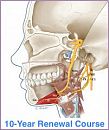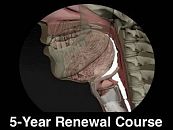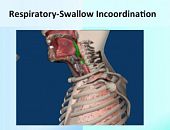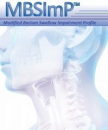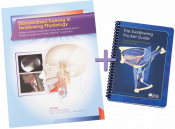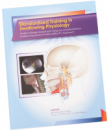Introduction To MBSImP™ – A Standardized Protocol For Assessment Of Swallowing Impairment #e001
Presenter: Bonnie Martin-Harris, PhD, CCC-SLP, BCS-S, ASHA Honors
Introduction to the MBSImP™ Approach and Protocol
Learn an evidence-based and standardized approach for assessment of swallowing impairment in the adult population.
This course introduces participants to the MBSImP™ Protocol. This approach provides a validated and evidence-based protocol to interpret, quantify, and communicate MBS study results in a manner that is specific, consistent, accurate and objective.
Participants will learn to profile and quantify physiologic impairment of swallowing function through application of the MBSImP™ scoring metric across 17 components of the swallowing mechanism. Learn how an assessment based on specific physiologic impairment, rather than a symptom-based assessment, better enables the clinician to link MBS study results to clinical action through targeted therapy.
This optional introduction course serves as an excellent preparatory course for those SLPs planning to go on to enroll in the full course, MBSImP™ Standardized Training and Reliability Testing (course #e01). It also touches on other pertinent topics related to interpreting MBS studies and assessing swallow function. Course focus is the adult population.
Offered for 0.6 ASHA CEUs – 6 contact hours.
Course Overview

This Course Features Seven Sessions:
- Standardizing the MBS Study (1:07:12)
- The 17 Physiologic-based MBSImP™ Components (41:33)
- Standardizing Interpretation of Impairment Part I (1:31:14)
- Standardizing Interpretation of Impairment Part II (1:22:08)
- Overall Impression (OI) Scoring (33:36)
- Standardizing Patient Assessment Reports (45:18)
- References (1:33)
"The systematic approach to scoring an MBS and the systematic approach to doing the MBS are amazing for actual clinical practice! This whole course was hugely helpful in identifying impairment and learning about the anatomy of the swallow. The speaker was probably the best I've ever seen in any course I've taken. She was excellent."
– A.K., prior course participant
Read more comments about this course!
Participants may work at their own pace and stop and re-start the course at any point. Participants retain access to course content after completion for ongoing reference and review.
Video course. Features a video lecture presentation with a downloadable handout. Participants may work at their own pace and stop and re-start the course at any point. Participants retain access to course content after completion for ongoing reference and review.
Reviews
"I really enjoyed the study in which they participated in and underlying the importance of standardized measurements. I was able to make connections between my dysphagia class and this course, like the functional domains of swallowing. I really enjoyed how informative course was." K.F. (Jun. 2025)
"I liked the real life examples and explanations of the 17 components." M.H. (Jun. 2025)
"Scoring of the 17 components was the best part. I liked that this is functional." D.M. (Jun. 2025)
"This course is well-organized, and delivers excellent clinical information that will improve the delivery of dysphagia care for clinicians of all experience levels." D.S. (May 2025)
"The rationale behind standardization was the best part. I liked the length and depth of information." L.B. (May 2025)
"Going through each component and seeing real world examples was most helpful. Very thorough course and also taught in a way that I was able to recall information." B.W. (May 2025)
"It was most beneficial breaking down each component of the whole swallowing mechanism; importance of looking at AP view. I liked the videofluoro examples and the animated simulations." E.H. (May 2025)
"Excellent comprehensive course, very well done!" A.L. (Apr. 2025)
"The Introduction to MBSImP course reinforced the standardized protocol for assessing swallowing impairment. Having completed the full MBSImP protocol, I found this course helpful in refining my understanding of component analysis and its role in consistent, evidence-based MBSS interpretation. It’s an excellent resource for ensuring accurate assessment and effective treatment planning in dysphagia management." R.N. (Apr. 2025)
"Detailed information and explanations. Loved all the examples and it was great to learn about a standardized method of evaluating the swallowing mechanism." N.Z. (Apr. 2025)
"I liked all of it. Real time fluoro videos and multiple examples of each impairment." M.Z. (Apr. 2025)
"Using the 17 components to evaluate MBSS was beneficial. I liked all the fluoroscopy examples!" L.T. (Apr. 2025)
"I found all of the information presented very useful for my daily practice as I work in a hospital setting utilizing instrumental assessment of swallowing skills on a regular basis. The information provided me with additional guidance as to the importance in standardizing diagnostic testing and in use of the A-P view during assessment. I also found it beneficial to learn the importance of documenting, which I do this, trace residual on the base of tongue and/or in the oral and pharyngeal cavities despite the fact that this information does not significantly impact overall scores. This course was very thorough and organized. I liked the multiple fluoro and animated simulations to support the information presented as this made it very easy to comprehend the information presented." W.N. (Mar. 2025)
"Everything was presented in such an easy-to-understand format. I could work at my own pace and was great review." G.O. (Mar. 2025)
"It was helpful learning about what to watch for in A/P view and learning how to judge laryngeal elevation. There were lots of video examples of what to look for." J.V. (Mar. 2025)
"I liked the breakdown of each stage of MBSImP and the easy access to content." M.C. (Mar. 2025)
"Walking through each component in detail was beneficial. I liked the speaker." J.O. (Feb. 2025)
"Identification of landmarks was helpful. This course was thorough." C.P. (Feb. 2025)
"Running through each component with fluoroscopic examples and animations to better understand what impairment for each component looks like." D.G. (Jan. 2025)
"The 17 components with examples using the animations and actual studies were helpful. I really liked how the presenter expressed that even seasoned therapists have to be open to new procedures. Standardization was needed and this makes it work. Although it is very humbling to have younger clinicians tell me that I need to take this current course when I have been doing studies 38 years. I have to admit. I needed this." G.L. (Jan. 2025)
"The speaker was very knowledgeable. MBSImP individual breakdown of components was beneficial." H.V. (Jan. 2025)
"MBSImP components, scores and score definitions were the most helpful. Liked that the handouts and documents were also provided." E.O. (Jan. 2025)
"I found the impairment profile most beneficial and look forward to utilizing it in my daily practice. I liked that the instructor went through the impairment profile and was very detailed about it." K.S. (Jan. 2025)
"I liked the review of components and practicing scoring real life VFSS." S.S. (Dec. 2024)
"Standardization topics were helpful. I liked the ease of study." J.W. (Dec. 2024)
"Learning the reason behind using MBSImP in my clinical practice and how this can help me make treatment decisions regarding my patients. All of the information was very interesting. Being able to walk through each component of the swallow with the speaker to ensure I was seeing the same things did give me more confidence in my skills." J.H. (Dec. 2024)
"Refined my understanding of each component and the protocol in general in order to enhance my practice and reporting." S.L. (Dec. 2024)
"All of the information was helpful- wonderful framework for assessing physiology." A.K. (Dec. 2024)
"Beneficial standardization for administration and interpretation of MBS. I liked the use of imaging from MBS and animations for educational purposes." A.B. (Nov. 2024)
"The real and simulation videos cleared up a lot. Also, I liked how we "scored" a video, and it was reviewed together." J.L. (Oct. 2024)
"I liked the intro to the methods without going into too much detail. Good case studies." L.E. (Oct. 2024)
"The detailed description of the scoring components was beneficial. I enjoyed being able to access the course at my convenience." A.W. (Oct. 2024)
"The breakdown of each component and the use of visuals were helpful. I liked how easy it was to go back to the course when necessary." P.J. (Oct. 2024)
"It was beneficial understanding the physiological components of swallowing function. Provided examples of VFSS to differentiate normal function from impairment across 17 physiologic components of the swallowing mechanism." A.M. (Oct. 2024)
"Discussion of the protocol in general was beneficial. I enjoyed the specificity of this course, the animations and fluoro videos, and Bonnie's clear and concise speaking style." S.M. (Oct. 2024)
"Standardizing the way we score and how to score each component. I liked the video images." S.C. (Sep. 2024)
"Breakdown of the individual physiological components identifying what is "normal" vs impairment. The visual imagery provided excellent feedback on what is "normal" vs impairment." K.C. (Sep. 2024)
"Beneficial assessment of MBS studies and application of strategies and determining treatment. I liked the use of MBS studies for functional application of information." N.M. (Sep. 2024)
"Defined each component and how to use it to identify impairment rather than just the presence of penetration/aspiration. Very specific video examples." K.S. (Sep. 2024)
"Printed guidelines to follow were beneficial. I liked the virtual and real MBS videos - great comparison." J.G. (Sep. 2024)
"Variations that might be seen due to various procedures were helpful. The sample fluoro videos were greatly appreciated." H.M. (Aug. 2024)
"The video examples were helpful." B.M. (Jul. 2024)
"I liked the swallowing components and learning how to assess them. Plethora of examples and videos." J.T. (Jul. 2024)
"Detailed explanation of each of the 17 components. Clear explanation and use of images." S.C. (Jul. 2024)
"Notating specific landmarks for the anatomical structures. I appreciate the goal of a standardized protocol." R.S. (Jun. 2024)
"Discussing each component individually was beneficial. The videos and animation to depict the different scores were valuable, and of course learning from Bonnie Martin-Harris is a delight." M.M. (Jun. 2024)
"Scoring components on VFSS was helpful. I liked the combination of videos/images/written information." K.D. (May 2024)
"The detailed breakdown of the pharyngeal swallow was beneficial. I enjoyed the functional application." L.C. (May 2024)
"AP view was helpful. Easy to follow course with many visuals." C.B. (May 2024)
"I liked the video examples with MBSs and also with animations. Swallow onset time by watching hyoid movement was helpful." S.B. (Apr. 2024)
"The discussion that less textures and trials can yield similar information was helpful. I enjoyed the videofluoroscopic paired with the animated model." O.B. (Apr. 2024)
"Going through each component with examples was beneficial. I liked that the course was divided into multiple parts, and I can always go back to refresh my knowledge." C.I. (Mar. 2024)
"Going through each of the different component-specific guidelines along with the visuals was helpful. I liked that I could go at my own pace." N.L. (Feb. 2024)
"Everything was beneficial. This course changed a great deal of my perspective on how to obtain more comprehensive information during my MBSS. I liked the visual examples, especially when including real patients as well as potential compensatory strategies to mitigate impairments." L.S. (Feb. 2024)
"The detailed explanations on the 17 components using the video and animation examples were very helpful. I liked that I could enter the course any time and proceed at my pace." R.S. (Jan. 2024)
"The overall standardization of MBS and the scoring components were beneficial. I appreciated that the course was organized into different sections instead of the full 6 hours in one seminar." H.M. (Jan. 2024)
"Breakdown of components- overall review of information for seasoned clinicians. Systematic approach. Videos- both animated and real-life images. I liked how the course was broken into sections and allowed the clinician to work at their own pace." R.C. (Jan. 2024)
"I liked the generous amount of handouts and resources provided to reinforce the lecture. The rationale for standardization was helpful." K.M. (Dec. 2023)
"Discussing the benefits of standardization; what a swallow study is and is not." L.N. (Dec. 2023)
"All topics were beneficial. I enjoyed the ease of course navigation and the handouts." D.B. (Nov. 2023)
"A deep dive into the 17 components and rating scales. I liked the examples of each of the scoring criteria across all 17 components utilizing both VFSS and animation." S.B. (Nov. 2023)
"I liked the handouts and lectures. Course was easy to navigate." M.S. (Nov. 2023)
"The bolus protocol, textures, and amount were helpful to discuss. I liked the handouts." J.A. (Nov. 2023)
"Going over each component of MBSImP images was beneficial. I liked the pace and material with a supported explanation as to the manner each component was tested." B.H. (Oct. 2023)
"I really enjoyed this course. I'm looking forward to completing the full version in the near future. I really enjoyed the videofluoroscopy videos in conjunction with the animated videos to help me identify the structures and where the bolus was. The videos were awesome." M.D. (Oct. 2023)
"The presenter was so knowledgeable and really explained everything in such a way that everything made sense. She was so interesting. I can analyze what I'm seeing and score it correctly. I loved it!" M.D. (Oct. 2023)
"Very thorough course! I liked the scoring guidelines." G.E. (Sep. 2023)
"The overview of the MBSImP was helpful to have a true preview of the material. Easy accessibility!" A.D. (Aug. 2023)
"I enjoyed the entire course. Viewing normal vs. abnormal swallow function was helpful. I liked the videos, case studies, real-life examples." P.M. (Aug. 2023)
"I liked the use of a standardized assessment for MBS studies. The frame-by-frame review of various MBS studies was beneficial." A.D. (Aug. 2023)
"The repetitive practice was beneficial. Many opportunities to practice." M.T. (Aug. 2023)
"Learning the finer details of the MBSImP was invaluable!! I LOVE that I could get such a good overview so that I understood the concepts." L.D. (Jul. 2023)
"Improved my knowledge about physiologic areas that were not taught to me during grad school. I liked the impacts on treatment planning, ability to standardize MBSS at our hospital for reliability, and improved vocabulary for report writing. I liked the videos and detail provided for all the components." S.F. (Jul. 2023)
"The scoring part was very informative. I liked that I can take my time in watching the videos, and that I could go back and rewatch whenever I wanted." A.L. (Jul. 2023)
"Analyzing the 17 physiological components and additional clinical advice that was given throughout this course was beneficial - i.e., transferring the information to functional living / recommendations / future management / compensatory strategies and exercises. I liked being able to take sections at my own pace - stop and start the videos and revisit content, and download supporting materials. I also liked seeing the animations alongside videofluoroscopic imaging to support learning." R.F. (Jul. 2023)
"Definitions of each functional component were beneficial. The videos were great!" A.F. (Jun. 2023)
"The standardization model was beneficial. I like listening to Bonnie Martin-Harris report her work." L.E. (Jun. 2023)
"Objectively quantifying the data collected in MBS studies will provide for much more accurate report writing, recommendations, and communication w/ other SLPs. Loved the video illustrations as well as the actual MBS studies to enhance my understanding of the swallow." M.B. (Jun. 2023)
"I liked the case studies and overall material." C.A. (May 2023)
"This course will literally change how I evaluate during a video swallow study." S.B. (Apr. 2023)
"The observation of each specific component and scoring simplifies the final report and interpretation of the study. Sessions were VERY easy to follow, clear explanations to help understand concepts." C.E. (Apr. 2023)
"Implications of the protocol were beneficial. I liked that the course was broken up into segments." M.B. (Apr. 2023)
"The videos going through the different components and how to score these was beneficial. I have recently commenced my MBSImP training.... this introductory course has allowed me to have an overview of how to get going with my training." V.S. (Feb. 2023)
"Great presenter. Great video footage, both diagrams and videofluoroscopy studies. Good range of patients." V.S. (Feb. 2023)
"Learning about tongue base retraction was beneficial. The animated images were helpful." A.H. (Feb. 2023)
"I liked all of it. Seeing lots of swallow studies and learning to distinguish anatomical structures and different features of swallowing impairment." A.J. (Jan. 2023)
"I complete MBS frequently at work and this course will assist in standardization by the team. I liked the ease of being able to take this course online." S.K. (Jan. 2023)
"The VF & animated examples were so helpful in understanding each swallowing component. I liked the course pacing and real life examples." K.S. (Dec. 2022)
"All topics were excellent. I liked that I could take breaks as needed." B.S. (Dec. 2022)
"This content gave me a new perspective on how I look at and interpret MBSs. I found the entire course to be relevant to my daily practice." L.R. (Dec. 2022)
"Course was extremely informative going between the speaker and her many videos to outline what she was referring to. The entire presentation made me realize the importance of completing the entire MBSImP course and protocol to incorporate in my daily practice." A.R. (Dec. 2022)
"I liked the breakdown of the 17 swallow components. Repetition and detailed walk-though of each component was beneficial." J.B. (Dec. 2022)
"Lots of swallow videos. Speaker was excellent." J.B. (Nov. 2022)
"A great refresher on anatomy, and great for updated swallowing info." K.F. (Nov. 2022)
"The depth of information and discussion of the rationale behind this protocol impacting patients every day in our work environment was great! I also loved the app for swallowing to educate patients and their families. What an enormous amount of research and time to improve the world of speech-language pathology!" P.A. (Nov. 2022)
"I liked the breakdown of the components and scoring definitions." K.W. (Nov. 2022)
"I enjoyed going through the whole swallow study after the discussion about each component of the MBSImP. I felt like it really expanded my view of the continuity of the swallowing mechanism. I was blown away by Dr. Bonnie Martin-Harris' ability to explain such a complex process in such a clear way." N.P. (Oct. 2022)
"MBSImP Guide and scoring were very beneficial because I do MBS frequently. Guide to MBS impairment profile is the topic I liked best as well as the MBS components." E.E. (Oct. 2022)
"I now plan to better standardize and communicate findings in my reports. Dr. Martin-Harris did a great job presenting all of this information. I really appreciated all of the supplemental materials provided along with this course." A.M. (Oct. 2022)
"Excellent presentation. Clearly presented to increase understanding of reading MBS." L.M. (Sept. 2022)
"This course is very easy to follow. Liked learning implementation of this protocol." C.R. (Sept. 2022)
"Great to have objective measurements for the MBSS." C.R. (Sept. 2022)
"The review of the components and the format of the course were good." G.S. (Sept. 2022)
"Practical and thorough. Excellent animation and imaging studies demonstrating normal and impaired swallowing." V.M. (Aug. 2022)
"Learning about a standardized method of examining swallow function and dysfunction under fluoroscopy was beneficial for my practice." C.B. (Aug. 2022)
"I will use this entire analysis of swallow function in my daily practice. This course has helped me to more accurately pinpoint areas of weakness/dysfunction that contribute to dysphagia, and will help guide my treatment plan. I liked the very specific visual examples of each component with detailed explanations to give me a good idea of what each score looks like in each area. So, very helpful!" G.P. (Aug. 2022)
"The in depth and systematic approach to evaluating phases of swallow, impairments, and causes was good. The video simulations paired with the fluoroscopy videos helped me visualize the information." J.P. (Aug. 2022)
"I liked having the animated swallows side by side with actual swallow studies." H.Y. (Aug. 2022)
"I thought that both the animated and actual swallow study showing the different components and ratings were extremely helpful." C.P. (Aug. 2022)
"I liked the real time and animation swallowing models. And the discussion of radiation dose considerations." S.S. (Aug. 2022)
"I liked the discussion of how to specifically rate each component." T.M. (Aug. 2022)
"I enjoyed all the visuals and practical application, and the standardization of assessing 17 evidenced-based physiologic components of swallowing." K.W. (Aug. 2022)
"Very thorough, evidence-based course. Liked learning the impact of esophageal clearing on oral and pharyngeal swallowing." O.S. (July 2022)
"I learned more through this course then I ever did in graduate school. It's so beneficial to see the videos and break it down in order to determine exactly what's going on and the function of each structure at each stage of the swallow. Liked the videos with in-depth discussion on each component, and the fact that it is a standardized program." S.H. (June 2022)
"The review of the components was great because everything was broken down so I knew exactly what I was looking for. I feel that this course was very functional and it is something that I can directly relate to my practice as a SLP." K.M. (June 2022)
"I liked the inclusion of so many swallow studies within the course." J.M. (June 2022)
"The 17 physiological components listed in the protocol during assessment along with the varying degrees of impairment were beneficial." S.T. (June 2022)
"I liked reviewing actual MBSS along with animations to practice scoring." A.C. (June 2022)
"The thorough explanation and example videos were good!" M.H. (May 2022)
"Clearly tutored, structured way of going through the protocol. Learning a standardized protocol, very useful!" F.S. (May 2022)
"The systematic approach to scoring an MBS and the systematic approach to doing the MBS are amazing for actual clinical practice! This whole course was hugely helpful in identifying impairment and learning about the anatomy of the swallow. The speaker was probably the best I've ever seen in any course I've taken. She was excellent." A.K. (May 2022)
"I liked the specific examples and visuals comparing different scores in each component of the swallow. The course had great structure, visuals, and was very detailed for an introduction!" R.B. (May 2022)
"I really enjoyed having the visuals of the modified barium swallow studies along with the verbal explanations." M.C. (May 2022)
"The course was very well presented with lots of examples." K.B. (Apr. 2022)
"I liked the standardization aspect. This is something that you can use in practice with patients." A.M. (Apr. 2022)
"Excellent organization of coursework, presentation of materials, supported with visual demonstration and explanation." E.M. (Mar. 2022)
"I liked the breakdown of overall impression scoring." N.T. (Mar. 2022)
"I liked the physiology components, being able to separate them, but also see how they work together." E.G. (Mar. 2022)
"Very easy to listen to with lots of good, clinical examples and anecdotes." N.C. (Mar. 2022)
"MBSImP scoring in real time with many examples." C.H. (Mar. 2022)
"Learning how swallow impairment can be judged without looking at every individual food type, and how the scoring can be used to help interpret MBS more accurately." E.V. (Feb. 2022)
"I liked that you can take your time and review the material, and learning the overall scoring and breaking down the swallow function into all of its smaller parts." B.M. (Feb. 2022)
"The organization of the course was great. I look forward to taking the full MBSImP course." A.P. (Feb. 2022)
"Looking at mbss in a whole different way!" M.H. (Feb. 2022)
"I liked the general review of the protocol and its use and being allowed to go at my own pace." R.R. (Feb. 2022)
"It was well organized and broken down into teachable segments that I could go over several times if needed. I loved the animated version coupled with the fluoro videos, it was very helpful for understanding where landmarks are and seeing the normal swallow function compared to levels of abnormal." E.A. (Feb. 2022)
"The entirety of the MBSImP protocol is applicable to my work as an acute care, outpatient, & acute rehab SLP as I perform VFSS on a weekly basis." R.H. (Jan. 2022)
"Every topic of discussion regarding this protocol was useful/beneficial for my daily practice; learning about the time, research, and planning that went into protocol's development; video and animated demonstrations." J.S. (Jan. 2022)
"Overall premise of breaking the swallow down into small individual segments and functions - extremely interesting - will be of great benefit in treatment. Very impressed by the animations, they made the actual fluoro image a bit more able to follow." K.K. (Jan. 2022)
"I appreciated the education on laryngeal, thyroid and arytenoid movement during the swallow. These are things I have observed and considered for years, but was not taught, yet so valuable. Content applicable immediately to my patient care!" A.M. (Jan. 2022)
"Bonnie Harris-Martin is an excellent instructor. She provided useful information and it was evident that she is passionate about the work she and her colleagues are doing." M.H. (Jan. 2022)
"Pacing at a rate that I could digest, understand and remember. I liked the computer simulations paired with videofluoroscopic images." B.E. (Jan. 2022)
"I really appreciated the depth of her discussion on how the swallow functions. I liked the ability to pause and replay items of interest. I felt I really had time to take notes." S.N. (Jan. 2022)
"Every topic of discussion regarding this protocol was useful/beneficial for my daily practice." J.S. (Jan. 2022)
"The organization of the course was great. I look forward to taking the full MBSImP course." A.P. (Jan. 2022)
Course Objectives
- Apply a standardized, valid, and reliable approach to MBS assessment.
- Describe the implications on patient care related to the lack of standardization.
- Identify 17 physiologic components of swallowing function.
- Explain normal function from impairment across 17 physiologic components of the swallowing mechanism.
- Describe levels of swallowing impairment in a manner that is evidence-based and objective.
- Describe radiation exposure and pulse rate related to the MBS Study.
- Assess swallow impairment by applying MBSImP™ Overall Impression Scores.
Presenter & Disclosures

Bonnie Martin-Harris, PhD, CCC-SLP, BCS-S, ASHA Honors, is the Alice Gabrielle Twight Professor in the Roxelyn and Richard Pepper Department of Communication Sciences and Disorders, and Associate Dean for Academic Affairs in the School of Communication at Northwestern University. She is also Professor, Otolaryngology-Head and Neck Surgery and Radiation Oncology, Feinberg School of Medicine.
She is a Past-President of the Dysphagia Research Society, past Chair of the Specialty Board for Board Certification in Swallowing and Swallowing Disorders (BCS-S), and Associate Editor for the Dysphagia Journal. She is an ASHA Fellow, recipient of the 2016 Admiral Albert J. Baciocco Innovation Award – Medical University of South Carolina (MUSC), The 2017 12th Annual Pepper Lecturer, Northwestern School of Communication, Honorary Member of the MUSC Chapter of The National Academy of Inventors, recipient of Honors from the South Carolina Speech-Language-Hearing Association (SCSHA), 2010 MUSC College of Health Professions Scholar of the Year Award, and associate member of the Academy of Otolaryngology-Head and Neck Surgery and the American Head and Neck Society.
Dr. Martin-Harris is the author and developer of the first standardized method for videofluoroscopic assessment of swallowing impairment (Modified Barium Swallowing Impairment Profile, MBSImP™), translated to research and clinical practice in the United States, Canada, and 13 additional countries. She is also the author of the manual, "Standardized Training In Swallowing Physiology—Evidence-Based Assessment Using The MBSImP Approach" published by Northern Speech Services. Her work is funded by the National Institutes on Deafness and Other Communication Disorders (NIDCD), the Veteran's Administration, and the Mark and Evelyn Trammell Foundation.
Presenter Disclosures:
Financial — Bonnie Martin-Harris is presenter of online CE courses sponsored by Northern Speech Services; receives royalties.
Financial — Bonnie Martin-Harris is the author of "Standardized Training In Swallowing Physiology — Evidence-Based Assessment Using The MBSImP Approach" published by Northern Speech Services; receives royalties.
Financial — Bonnie Martin-Harris' former employer, MUSC, receives royalties from Northern Speech related to enrollment tuition of the MBSImP Online Training.
Financial — Bonnie Martin-Harris' MBSImP research and development was funded in part by Bracco Diagnostics; received grant funding.
Financial — Bonnie Martin-Harris' research is funded in part by the Veteran's Administration (VA); receives grant and research funding.
Financial — Bonnie Martin-Harris' research is funded in part by the Mark and Evelyn Trammell Foundation; receives grant funding.
Financial — Bonnie Martin-Harris' research is funded in part by the National Institutes on Deafness and Other Communication Disorders (NIH/NIDCD); receives grant and research funding.
Nonfinancial — Bonnie Martin-Harris is associated with numerous journals, publications, and boards related to speech-language pathology; receives no compensation in these roles.
Intended Audience / Accreditation

This program is offered for 0.6 ASHA CEUs (Intermediate Level; Professional Area).

Intended Audience
- Speech-Language Pathologists
ASHA CEUs:
Northern Speech online courses are registered with ASHA and are offered for ASHA CEUs. The number of ASHA CEUs is noted above. Note that 0.1 ASHA CEU = 1 contact hour = equals 1 CEE.
Earning ASHA CEUs and the ASHA CE Registry:
To earn CEUs from this course and have ASHA CEUs submitted to the ASHA CE Registry, course participants must satisfy each of these requirements:
- Participants must meet the eligibility requirements to earn ASHA CEUs (see below).
- Participants must indicate – prior to course completion – their intent for Northern Speech to submit this course to ASHA.
- Participants must complete/view this course in its entirety.
- Participants must complete the course post test with a minimum of 80% accuracy.
- After successful completion of the post test and completion of the course evaluation, a certificate of course completion is presented to the participant electronically via PDF.
- For those participants who indicated their intent for the ASHA CE Registry, course completion status will be submitted by Northern Speech to ASHA within 45 days of the course completion date.
Eligibility To Earn ASHA CEUs:
Attendees must meet at least one of the following conditions in order to be eligible to earn ASHA CEUs:
- Current ASHA Member.
- ASHA Certificate of Clinical Competence (CCC) Holder.
- Licensed by a state or provincial regulatory agency to practice speech-language pathology (SLP) or audiology.
- Credentialed by a state regulatory agency to practice SLP or audiology.
- Credentialed by a national regulatory agency to practice SLP or audiology.
- Engaged in a Clinical Fellowship under the supervision of an individual with their ASHA CCC.
- Currently enrolled in a master's or doctoral program in SLP or audiology.
If an attendee is not an ASHA member or CCC holder but meets any of the above criteria, they may inform the ASHA CE Registry of their eligibility by visiting this site.
ASHA CE Registry:
During the enrollment process, if you select to receive ASHA credit for this course and if you provide your ASHA number, Northern Speech will automatically submit your CEU information to the ASHA CE Registry after successful course completion (80% on post test). This submission happens once per month, during the first week of the month. For example, if you complete your course on November 7th, Northern Speech will submit all November online course CEUs to ASHA during the first week of December. When ASHA inputs the information into their database, they will mark the course as completed on the last day of the month in which it was completed, so November 30th using this example. The certificate of completion available for you to print immediately, however, will reflect the actual completion date, November 7th in this example. Due to ASHA processing procedures please allow 2-3 weeks, from the submission date, for the course to appear on your ASHA transcript.
Licensing Boards: Most state licensing boards DO accept CEUs earned online (usually classified as home-study credits). Some state boards do, however, place a limit to the number of credits that can be earned via home study/online courses. For the most current information, we suggest that you contact your licensing board or agency to verify acceptance policies and/or any credit limits related to home-study courses prior to registering for this course.
Additional accrediting agencies by which Northern Speech is an approved CE provider:
- California: NSS is approved as a provider of continuing education by the California Speech-Language Pathology & Audiology Board. Provider #PDP4. Online CEU limits may apply; please contact SLPAHADB for current online CEU acceptance policies.
- Iowa: NSS is approved as a provider of continuing education by the Iowa Board of Speech Pathology and Audiology Examiners. Provider #169.
- Kansas: NSS is approved as a provider of continuing education by the Kansas Department of Health and Environment. Provider #LTS-S0005.
Frequently Asked Questions
Customer Support: Please phone 888.337.3866 or email info@northernspeech.com.
Course Completion Timeframe:
You have unlimited time to complete our online courses. You may log off and log on as often as you’d like to in order to complete all sections of a course.
However, completion dates are based on Eastern Standard Time. Therefore, if you need your CEUs by a certain date, be sure to complete the course test before 11:59pm EST on that date. For example, if you need CEUs before January 1st, you will need to complete the course test before 11:59pm EST on December 31st.
Content Access:
Access to course materials and content does not expire, even after completing the post test. You may continue to review course material by logging into your NSS account, clicking the My Online Courses tab, and then viewing your desired course.
Certificate of Completion:
On successful completion of the post test (80%), a certificate will be immediately available for download and/or printing. This certificate will include your name, date of completion (based on Eastern Time Zone, USA/Canada), and number of contact hours (CEUs / CEEs). Please note that CEUs are awarded on the date of successful test completion, not the date of course enrollment. Please ensure that you successfully complete the post test prior to any licensure renewal dates.
ASHA CE Registry Submission:
During the enrollment process, if you select to receive ASHA credit for this course and if you provide your ASHA number, NSS will automatically submit your CEU information to the ASHA CE Registry after successful course completion (80% on post test). This submission happens once per month, during the first week of the month. For example, if you complete your course on November 7th, NSS will submit all November online course CEUs to ASHA during the first week of December. When ASHA inputs the information into their database, they will mark the course as completed on the last day of the month in which it was completed, so November 30th using this example. The certificate of completion available for you to print immediately, however, will reflect the actual completion date, November 7th in this example. Due to ASHA processing procedures please allow 2-3 weeks, from the submission date, for the course to appear on your ASHA transcript.
Purchase Orders:
Purchase orders are currently not accepted for online orders, if you wish to submit a purchase order please do so at info@northernspeech.com or fax to 888-696-9655.
What is an Online Course?
Our Online Courses consist of video, audio, and/or text content and are offered for ASHA CEUs. Unlike a webinar, which requires participants to be logged on and at a computer at specific times, our Online Courses are available to you at any time, from any device, via your NorthernSpeech.com online account. You may work at your own pace and start and stop your course as you wish. Your course will conclude with a short post test. On successful completion of the post test (>80%), a printable certificate of completion is presented to you.
Receiving CEUs:
Northern Speech is an ASHA CE Provider and our online courses are registered with ASHA and offered for ASHA CEUs. Please note that successful completion of the online post test is required prior to the awarding of CEUs. Please contact your state licensing board for acceptance policies related to CEUs earned online. Please note that courses offered for university students are not applicable for CEUs.
Registering for an online course:
You may browse all online courses by clicking the Continuing Education tab above, then Online Courses. Once you find a course, click Enroll Now, and you will be asked to either log into your existing Northern Speech account or create a new online account. Once you’ve entered your account information and provided your credit card payment, your course will be immediately available to you.
Accessing your purchased course or returning to a purchased course:
You will be able to access your online course by logging into your Northern Speech account and then clicking the My Online Courses tab on your profile screen. Click the course you would like to start or to resume. From there, proceed through the course sections until you are ready to complete the post test. You do not have to complete your course all at once. You may log on and off as you wish.
Testing requirements:
Each online course concludes with a post test consisting of multiple choice or true & false questions. Scores of 80% or greater are required for successful course completion and awarding of CEUs. You may revisit course materials and retest as needed to achieve a passing score.
Number of CEUs offered:
We offer courses from 1 to 21 contact hours. Each course will note the number of CEUs offered. Please note that 0.1 CEU = 1 contact hour = 1 CEE.
State licensing boards and online CEUs:
NSS is an ASHA CE Provider and most state licensing boards DO accept ASHA CEUs earned online (usually classified as home-study credits). Some boards do, however, place a limit to the number of CEUs that can be earned via home study/online courses. For the most current information, we suggest that you contact your licensing board or agency to verify acceptance policies and/or any CEU limits related to home-study courses prior to enrolling in an online course.
Course formats:
Our course formats include: text, audio, video, and PowerPoint with author narration. Each course will note the format on the course description page. Most courses include closed captioning.
Course handouts:
Most of our online courses provide a link to download the accompanying handout as a PDF file.
Group discounts:
Groups of 3 or more are eligible for a 20% discount on each registration on most of our online courses. To receive this discount, registrations need to be processed together via the "Group Rates" tab on the Online Course of your choice.
Computer requirements:
For our online courses to function best, we recommend that you update your computer to include the newest version of your Internet browser (Safari, Chrome, Firefox, Edge, Internet Explorer, etc.) and newest version of your computer's operating system. Also a high-speed Internet connection is recommended (cable or DSL). Speakers or headphones will be required for many of our courses as many contain audio components.
Course Cancellation Policy:
A purchased online course can be exchanged, refunded, or transferred to another individual if contact is made with NSS (via phone or email) within 30 days of purchase and the course materials have not been viewed or downloaded.
Special Needs:
Please click here for any special needs requests, and we will do our best to accommodate them.
| Contact Us |





